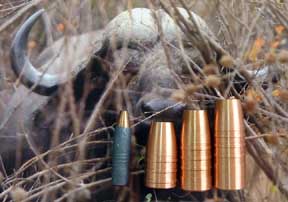

 The Accurate Reloading Forums
The Accurate Reloading Forums  THE ACCURATE RELOADING.COM FORUMS
THE ACCURATE RELOADING.COM FORUMS  Rifles
Rifles  Big Bores
Big Bores  nickel cases
nickel casesGo  | New  | Find  | Notify  | Tools  | Reply  |  |
| one of us |
Not knowing "The" answer to this it seems highly unlikely that nickel plated brass would tend to stick, but just the opposite. Since the plated brass is much more rigid, in my experience, it would seem that it would not as likely stick as unplated, soft brass. | |||
|
| One of Us |
I was told that it was not as good for the reason that it was harder than regular brass cases, and therefore tended to crack easier the end result being less reloads out of each case. I do not know if this is right, I have a couple of hundred winchester supreme nickel cases I will probably never reload these 22/250 shells as this factory round produces 3 shot 1 hole groups at 100 yards and it would take me lots of money and components finding a combination that shot as well. Regards PC. ------------------ | |||
|
| <Daryl Elder> |
Actually nickel cases tend to be more slippery than regular brass cases. Bolt thrust caused by the case coming back against the bolt face can be an unwanted thing and some bench rest shooters request a "rough" chamber to prevent bolt thrust. Regular brass cases tend to "grip" the chamber walls more than nickel. As far as life of nickel cases, I've reloaded some a half doz times and see no problems yet and I use some very stiff loads in my 30/06. The nickel doesn't corrode like brass; a concern in damp conditions. | ||
|
| one of us |
I have used nickel brass in my 300Wby for years and have had no problems what so ever. | |||
|
| <Bill T> |
All the Federal Safari grade ammo comes with Nickel Plated cases. I believe the reason for this is because it's far more resistant to tarnish than non plated brass, therefore in humid tropical conditions it will not tarnish from sweat and moisture as fast, if at all. The cleaner a case is, the easier it will extract. Bill T. | ||
|
| one of us |
33+ years of using Nickel cases and I have yet to find any of the old wives tales about nickel cases to be true. They do not scratch bores, dies, crack easier, dull trimmers, or any of the other bug-a-boos that have been blamed on them. Yes, the nickel can flake off after time, but the brass underneath is just fine. In the last ten years, I have not even had any cases flake nickel like they used to in the old days. Just remember this, nickel is harder than brass, but it is still a hell-of-a-lot softer than any barrel, die, or trimmer steel. If those are being scratched, it is by dirt being carried into the whatever. That just means the person doing the scratching is not keeping everything clean like they should be, and then look for a scape-goat on which to blame their mistake. JMHO. | |||
|
| one of us |
Nickel plated brass was made first in the late 1800s, or early 1900s to fix a real problem in the jungles of India, and the wetter climates of African rain forrests. The bare brass would carrode very quickly in the humidity of the jungle, and stick in the chambers of rifles, giveing the shooter only one shot, before his rifle was fixed. With an 700 lb tiger climbing your leg this was not a nice thing to have happen. This is the reason Federal ammo uses nickel plated brass for all their Safari grade ammo. It feeds like quicksilver, it never sticks in the chamber, regardless of weather, it doesn't collect grit like regular brass, and I find, it loads very well in my press. I will use nothing else in Alaska's rainy coastal hunting season, or Africa's dust! Anyone who is afraid of their nickel plated brass, I have a place where you can dispose of it. I'm a recycler, and all donations to a cleaner invironment can send it to me! ------------------ | |||
|
| Powered by Social Strata |
| Please Wait. Your request is being processed... |
|

Visit our on-line store for AR Memorabilia

